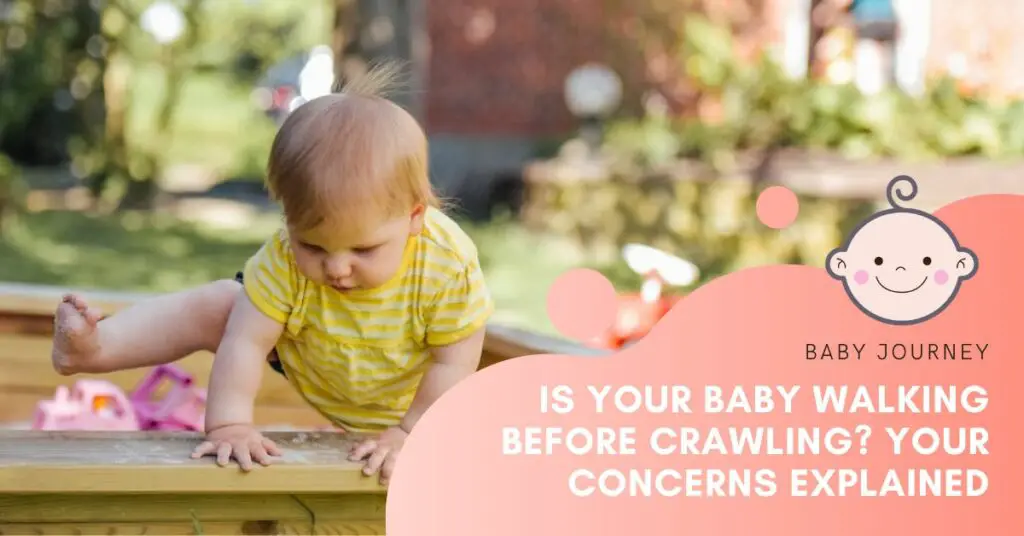You’ve just put your baby on one of the best baby pads for floor expecting the little angel to crawl but instead, your child skipped crawling altogether and started walking. Wait a minute, is this even normal?
If you are worried that your baby skipped a developmental milestone, here is the article you need. Walking before crawling is actually more common than you think, and some infants never learn to crawl.
In the past, pediatricians believed that babies who don’t crawl experience some developmental issues in the future. But, practice and research proved differently.
Do babies have to crawl? Yes, the crawling stage is significant for locomotion and movement development, but there is more to it. If your baby skipped crawling, keep reading to get all your concerns explained!
Is Crawling A Necessary Developmental Milestone for Babies?
Is crawling important? Yes, but, according to the Centers for Disease Control and Prevention (CDC), it isn’t considered a developmental milestone anymore. Crawling and brain development are connected because crawling is an independent motion that improves a baby’s sense of balance, problem-solving skills, coordination, and cognition.
But, babies that learn to walk before crawling, reach these goals and improve their skills in another way.
Formerly, crawling was a milestone for babies around nine months. The CDC removed it because of the lack of evidence to support babies crawling as a true developmental milestone for all babies. Also, some babies crawl at six months, others around 11, or in between, and some never do.
Pediatricians and parents were surprised to see the new CDC developmental milestones list because other than the cognitive benefits of crawling, this movement helps babies build core strength and shoulder stability. In simple words, crawling is significant for both physical and mental progress.
Don’t be confused, the importance of crawling is huge. The crawling phase is incredible and means a lot for babies’ progress, but it is an individual phase. Some babies never do it, and it is totally normal!
Can Babies Skip Crawling? When To Worry About Baby Not Crawling?
Can babies walk before they crawl? Sure, they can! If other physical growing milestones are met, babies don’t need to crawl to develop normally. Babies can explore their surroundings and strengthen their bodies enough to learn to stay on their feet and make first steps, so crawling isn’t necessary.
In the past, people expected babies who skipped crawling to be excellent athletes in the future. Others were focused on future potential developmental issues. Neither is true.
However, if a baby skips crawling, it isn’t a sign of developmental disabilities. It is completely fine that the baby doesn’t crawl on the knees, but makes moves differently. Maybe your child prefers moving on the buttocks or is ready to go straight to walking!
But, you should visit a doctor if the baby doesn’t crawl and doesn’t move limbs when you touch them. Also, if the baby only moves its body weight to one side or has low energy, visit a doctor immediately.
Babies with cerebral paralysis or autism may crawl asymmetrically, but it isn’t a rule. Also, some parents worry when their children suddenly change the way they crawl. In most cases, it is just a sign that the baby is improving her gross and fine motor skills.
In general, you shouldn’t focus on inspecting growing phases individually. We should approach the baby as a whole, and follow the complete progress. Ticking the accomplishments on a milestone list can lead to misunderstandings and unnecessary worries.
However, if your baby doesn’t show interest in exploring the environment, you should discuss it with your pediatrician.
Further reading: How to Teach Baby to Crawl
Are There Potential Dangers of Baby Walking Too Early?
On average, children start walking around 12 months. However, some babies may walk as early as six months, the current record for the earliest anyone has ever walked. On the other hand, some little angels don’t walk until they are 18 months old.
The dangers of baby walking too early confuses behavioral pediatrics and other experts these days. Some believe there is no harm to kids who walk earlier than average. Other doctors state that early walking increases the risk of Blount’s Disease and bowlegged kids.
But, there is not enough evidence to support this theory. In addition, family disease history is a more frequent determining factor that can tell whether the baby will suffer from Blount’s Disease.
Some also believe that early walking can tell what kind of personality the baby will have. Usually, children who start walking early show symptoms of impulsive behavior, enthusiasm, and curiosity more than babies who start walking at the average age.
Regardless, don’t worry if your baby stands or walks on its own before one year or needs more time to make the first steps.

If you wonder how to encourage crawling if a baby wants to walk, well there isn’t an answer to forcing the crawl before the walk. If the baby is ready to walk independently, you cannot stop her. However, you can support the baby by keeping the environment safe and being ready to hold the baby’s hands if he or she needs you!
How To Encourage Baby To Crawl?
There are easy ways to encourage baby to crawl! You can try several things below to help your baby crawl and help your child’s development.
Enough Tummy Time
First of all, pediatricians agree that practicing tummy time from birth helps with upper body strength. By building a strong body, the baby will easily make physical milestones, crawling included.
You can get the best baby play mat and let your child do their tummy time there. If your baby gets fussy during tummy time, entertain her with high-contrast toys and your voice.

Practice Reaching For Toys
Help the baby to reach for the toys. To do so, put toys away from the baby and watch if he or she tries to reach them. As your child becomes able to get them easily, expand the distance. It also helps with hand-eye coordination.
Use Your Palms
In addition, you can place the child on all four and put your palms against the baby’s feet. It will activate the baby’s reflexes and help baby push the body forward.
Keep the Floor And Environment Safe for Newborns
It is also important to ensure a safe environment for your baby to crawl. Move furniture to provide enough space for your kid to move independently. Be there for the baby, and make crawling a part of your everyday playtime routine and get a quality baby foam play mat to ensure your kid is as comfortable as possible.
To help your little one practice crawling, avoid keeping her long in a carrier or seat. It will make learning new skills, such as crawling, much more difficult!
Conclusion
Hopefully, things are clearer now about crawling. Don’t worry if your child skips crawling phase and goes straight to walking. Forget about old theories, because modern experts agree skipping crawling is normal!
Also, the range when you can expect your baby to start crawling is long and can start at six months and stretch to 12 months. But remember, all babies are individual and they learn new skills at different paces.
Has your baby crawled or walked first? If you have more questions about crawling, don’t hesitate to ask them in the comment section below!
–




